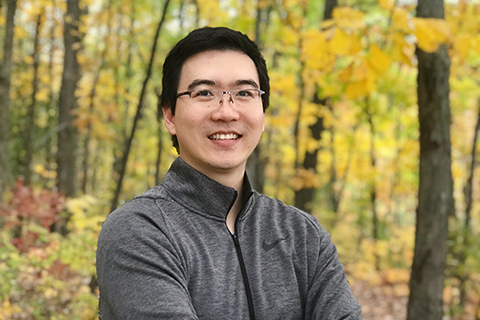- YouTube
- TikTok
OU professor wins Scialog award for research on ‘Signatures of Life in the Universe’
Initiative seeks to answer basic questions about the possibility of extraterrestrial life

Dr. Ziming Yang, an assistant professor of environmental chemistry at Oakland University, is among eight multidisciplinary teams of researchers selected to receive funding in the inaugural year of Scialog: Signatures of Life in the Universe, a new research initiative designed to bring the world closer to answering basic questions about the possibility of extraterrestrial life.
As a Scialog Fellow named by the Research Corporation for Science Advancement (RCSA), Yang was invited to join with 53 other early-career scientists from universities and research institutes in the U.S. and Canada to discuss and address important questions about life in the universe, such as planet habitability, origin of life, detection of biosignatures, and how to find evidence of life beyond Earth.
 |
| Dr. Ziming Yang |
The program is sponsored by the RCSA, the Heising-Simons Foundation, NASA, and the Kavli Foundation. This Scialog award will provide Yang and his collaborator, Dr. Marc Neveu, a research scientist at the NASA Goddard Space Flight Center, with $110,000 in funding ($55,000 each) for their project, titled “How may Biosignatures in Icy Ocean Worlds be Affected by Plume Ejection?”
“The project will focus on biosignatures in geysering plumes from icy ocean worlds such as Saturn’s moon Enceladus,” Yang said. “We proposed to build a plume simulator that can experimentally examine how biosignatures are affected through the plume ejection. Our goal is to seek bridging an essential gap for interpreting and validating plume measurements in future search-for-life missions.
“This is a very exciting project for me and my research group at OU,” Yang added. “Spurred by this novel collaboration established through Scialog, we are looking forward to extending our existing research to new areas in astrobiology and planetary science.”
Scialog is short for “science + dialog.” Created in 2010 by the RCSA, the Scialog format brings together communities of early-career scientists to advance basic science in areas of global importance and to write proposals for high-risk, high-reward collaborative research projects based on the ideas that emerge at the conference.
“As a nation, we are investing considerable resources in the search for life beyond Earth, so it makes sense to identify exciting new research directions in this field by bringing together experts from a range of disciplines,” said RCSA President & CEO Daniel Linzer. “These multi-disciplinary discussions, in this case among astronomers, biologists, chemists, geologists, and physicists to talk about planets within and beyond our solar system and the origins of life on Earth, is just what Scialog is about.”
The inaugural meeting of Signatures of Life in the Universe was held virtually June 10-11, 2021. Guided by senior facilitators, who are leading researchers, participants from fields including Earth and planetary science, chemistry and physics, astronomy and astrobiology, microbiology and biochemistry, and data science brainstormed about transformative research projects that could bring the world closer to answering basic questions about the possibility of extraterrestrial life.
“As we discover an abundance of other planets, it is entirely possible that some of them host life,” said Cyndi Atherton, science program director at the Heising-Simons Foundation. “Given the advances in this area of astronomy, this Scialog is perfectly timed to maximize possible projects, collaborations, and further discoveries, perhaps the kind that we only dreamed of in past generations.
“In 20 years we may look back on transformational discoveries about life in our universe and trace them to the grants arising out of the 2021 Scialog,” she added.
The RCSA is a foundation providing catalytic funding for innovative scientific research and the development of academic scientists since 1912. Among the scientists supported by the RCSA, 41 have received Nobel Prizes.
To learn more, visit https://rescorp.org/.


 September 30, 2021
September 30, 2021